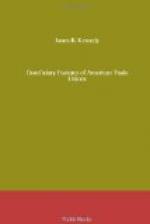[Footnote 229: Constitution of the Brotherhood of Railroad Trainmen, 1903 (Cleveland, 1903), p. 35; Constitution of the Switchmen’s Union of North America, 1903 (Buffalo, n.d.), p. 16; Constitution of the United Brotherhood of Carpenters and Joiners, 1905 (Milwaukee, n.d.), p. 19; Constitution of the Brotherhood of Painters, Decorators and Paperhangers of America, 1906 (La Fayette, n.d.), p. 20.]
[Footnote 230: Constitution of the Brotherhood of Locomotive Firemen, 1905 (Indianapolis, n.d.), p. 34; Constitution of the Maintenance-of-Way Employees, 1903 (St. Louis, n.d.), p. 13; Constitution of the Grand International Brotherhood of Locomotive Engineers, 1904 (Cleveland, 1904), p. 85.]
A member whose claim for a death or disability benefit has been rejected may appeal from the decision of the official authorized to pass upon claims. The provisions of the Trainmen are typical. Every claim rejected by the secretary-treasurer is referred to the Beneficiary Board, consisting of the grand master, the assistant grand master and the secretary-treasurer. If rejected also by the Board the claimant may appeal to the Grand Lodge “at its next succeeding session, but not afterward.” The appellant must give a written notice to the grand secretary-treasurer of his intention to appeal.[231]
[Footnote 231: Constitution of the Railroad Trainmen, 1903 (Cleveland, 1903), p. 39.]
The unions paying the sick benefit fall into two classes according as they administer the benefit directly from the offices of the national union with the aid of the local union or as they intrust the administration of the benefit to the local union and leave to the national officers only a general supervision. The Boot and Shoe Workers, the Barbers and the Tobacco Workers are in the former class, while in the latter are the Cigar Makers, Iron Molders, Typographia, Plumbers, Leather Workers on Horse Goods and the Garment Workers.
The chief means relied upon to guard against fraud are the certificate of the attending physician and the report of a visiting committee of the local union. Some of the unions require both the certificate and the report; the larger part, however, rely on the report of the visiting committee, although local unions are permitted to require that a physician’s certificate shall be furnished. The duties of the visiting committee are set forth with great elaboration in all the constitutions. Thus, the Boot and Shoe Workers require that the claim shall be investigated by “three Union members of good repute not related to the sick member, each acting independently of the others and reporting individually to the local executive board.” The Plumbers and Cigar Makers require that every sick member shall be visited at least once in each week and that no two members of the committee shall visit him at the same time.




